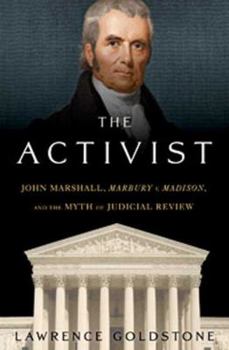The Activist: John Marshall, Marbury V. Madison, and the Myth of Judicial Review
Select Format
Select Condition 
Book Overview
In the waning days of his presidency, in January 1801, John Adams made some historic appointments to preserve his Federalist legacy. Foremost among them, he named his secretary of state, John... This description may be from another edition of this product.
Format:Hardcover
Language:English
ISBN:0802714889
ISBN13:9780802714886
Release Date:September 2008
Publisher:Walker & Company
Length:294 Pages
Weight:1.25 lbs.
Dimensions:1.0" x 6.3" x 9.5"
Related Subjects
19th Century Constitutional Law Courts History Law Legal History Rules & ProceduresCustomer Reviews
1 rating
The journey of judicial review
Published by Thriftbooks.com User , 16 years ago
Once you're traveling in Constitutional legal circles, "activist" is an epithet --- meaning, basically, that the other person with whom you do not share a political party is using the Constitution for political purposes. A horrible thing, to be sure. Most of the time (but not always, there are exceptions) the opposite epithet is "originalist," which means that the other person wants to interpret the Constitution based on the received wisdom of the Founding Fathers, looking down on us, as from a judicial Olympus with haughty and austere visages, proclaiming the Only Right Approach to Constitutional issues, in voices dry as dust and tinged with the irritation of the centuries. One suspects, however, that if the Founders were confronted with the issues the Supreme Court is now facing --- particularly the recent Establishment Clause case involving an obscure Utah cult dedicated, among other things, to the practice of mummifying pets --- that the exalted personages would find themselves laughing like drains at the absurdity of it all. Lawrence Goldstone's avowed purpose is to illustrate that one of the Founding Fathers --- John Marshall, the first great and consequential Chief Justice --- belongs in the "activist" category, and the question of whether he accomplishes this purpose will be left to the intelligent and discerning reader. What he actually manages to do, however (at least in the area of judicial review), is shatter originalism into a thousand broken pieces, scattered across the marble corridors of jurisprudence like the debris of a gallant but doomed civilization overrun by bandits. The book traces judicial review --- the idea that an unelected judiciary should have the authority to invalidate legislative or executive actions that conflict with the Constitution --- through the Articles of Confederation all the way down to the thump of Marbury v. Madison landing on John Marshall's desk. And what Goldstone finds in all this mass of historical evidence is the loud, clear, unequivocal voice of the Founding Fathers, stating in unison, "Well, I don't know, what do you think?" Of course, they said no such thing --- although it would have been much more helpful if they had, because (as Goldstone proves, and a comprehensive job he does of it) there really isn't all that much in the record, and what there is displays a good bit of division on the issue, when there is not a complete lack of effort to come to grips with the question. Goldstone follows the tracks of judicial review through the lost history of the ratifying conventions and the Federalist-Antifederalist debate, and comes up with a startling lack of consensus on how the Supreme Court should apply the Constitution to the law in case of a conflict. The issue wouldn't come up for quite some time --- not until the famous case of Marbury v. Madison --- allowing Goldstone to map out the early years of the Supreme Court, notable primarily for the Justice's gripes about "circuit riding," trav






